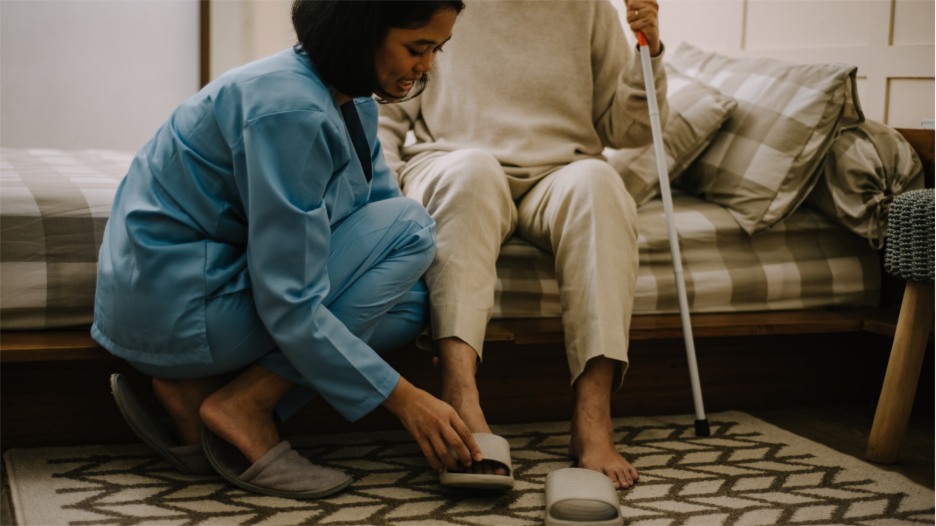As we get older, it's easy to overlook foot health but doing so can have serious consequences. Your feet support you every day, and aging brings changes that can lead to pain, mobility problems, and even life-altering injuries like falls. That’s why seeing a podiatrist for seniors is essential. These specialists understand the unique challenges aging adults face and offer targeted treatments to keep you active, independent, and comfortable.
In this article, we’ll explore how podiatrists help seniors manage common conditions such as arthritis, neuropathy, and diabetic complications. We’ll also explain the value of regular foot checkups, custom footwear, and how in-home podiatry services are making specialized foot care more accessible than ever.
Why Seniors Need Specialized Podiatric Care
As we age, our feet naturally undergo changes. The fat pads that cushion the soles thin out, circulation slows, and muscles lose strength. These shifts increase the risk of foot pain, infections, and balance issues. For seniors, even minor foot problems can escalate quickly.
That’s where a podiatrist for seniors makes all the difference. They’re trained to detect early warning signs, treat underlying issues, and help prevent complications before they start.
Common Foot Issues in Older Adults
Aging feet are prone to a variety of health issues. A podiatrist for seniors can treat and manage:
1. Arthritis and Joint Pain
Years of wear and tear can lead to stiff, painful joints in the feet and ankles. Podiatrists offer solutions like orthotic inserts, therapeutic exercises, and sometimes joint injections to reduce inflammation and improve mobility.
2. Toenail Disorders
Thick, discolored, or ingrown toenails are common with age and can be painful or prone to infection. A podiatrist ensures toenails are properly trimmed and treated especially important for those who struggle with self-care.
3. Neuropathy and Numbness
Nerve damage from conditions like diabetes can cause burning, tingling, or numbness in the feet. A podiatrist monitors nerve health, manages symptoms, and helps prevent related complications like foot ulcers.
4. Diabetic Foot Complications
Diabetes significantly increases the risk of foot ulcers, infections, and amputations. Podiatrists provide essential diabetic foot exams, wound care, and education to protect long-term foot health.
5. Balance and Fall Risks
Foot deformities, pain, or poor footwear can affect balance. Podiatrists recommend stability shoes, padding, and fall-prevention strategies to reduce the risk of injury.
What to Expect at a Podiatry Appointment for Seniors
A visit to a podiatrist for seniors typically includes:
- A comprehensive foot exam
- Assessment of circulation, skin condition, and nerve response
- Toenail and callus care
- Review of footwear and gait
- Discussion of any pain, discomfort, or difficulty with mobility
If needed, additional diagnostics like X-rays or referrals for custom orthotics may be included.
In-Home Podiatry: A Comfortable, Accessible Option
For many older adults, visiting a clinic can be difficult due to limited mobility or transportation challenges. In-home podiatry offers a convenient and safe alternative.
A podiatrist visits the patient’s home, assisted living center, or long-term care facility, providing personalized care in a comfortable environment. Services often include nail trimming, wound care, diabetic foot exams, and more.
Want to learn how seniors can support their foot health between visits? Read our blog on Creating the Perfect Foot Care Routine at Home for Seniors.
Benefits of Regular Podiatric Checkups for Seniors
Seeing a podiatrist regularly can lead to major improvements in quality of life. Key benefits include:
- Reduced pain and improved mobility
- Early detection of problems before they worsen
- Safer, properly trimmed nails
- Prevention of pressure sores and ulcers
- Guidance on proper footwear and balance support
Many seniors report that regular foot care reduces anxiety about falling and helps them stay active longer.

Choosing the Right Podiatrist for Seniors
Look for a provider who has experience with geriatric care and offers in-home services if needed. A great podiatrist for seniors should:
- Be gentle and compassionate
- Understand common conditions affecting older adults
- Offer solutions tailored to physical and cognitive limitations
- Communicate clearly and involve caregivers when necessary
Trust and comfort are key especially when dealing with sensitive foot concerns.
Final Thoughts: Don’t Wait on Foot Pain
Foot discomfort should never be brushed aside especially in older adults. With the help of a skilled podiatrist for seniors, you or your loved one can enjoy a healthier, more confident lifestyle.
Schedule an appointment with Allevio Care Anywhere to receive expert in-home foot care from providers who understand the needs of seniors.
A proactive approach to foot health can reduce fall risks, improve mobility, and preserve independence.
Key Takeaways:
- Aging feet need regular medical attention to stay healthy and pain-free.
- A podiatrist for seniors treats conditions like arthritis, neuropathy, and toenail problems.
- In-home podiatry offers a stress-free option for seniors with mobility challenges.
- Consistent care helps prevent complications and improves quality of life.
Don't wait until discomfort becomes a crisis prioritize foot health today.






